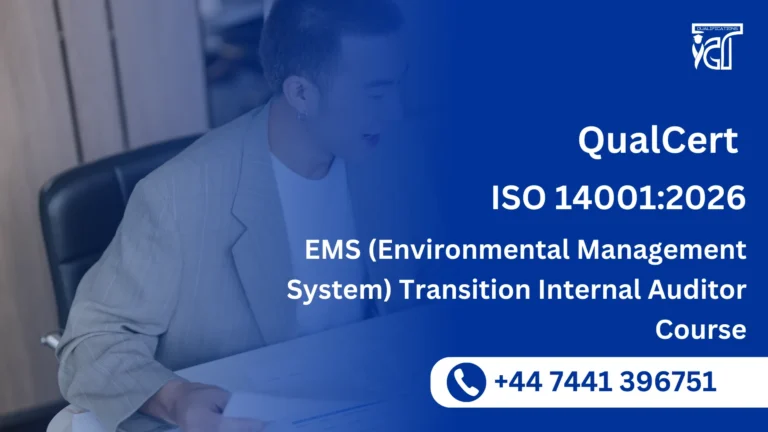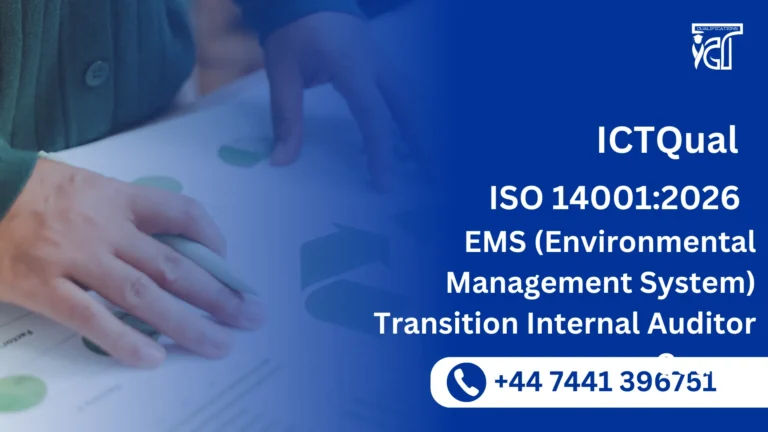The ICTQual Level 6 Diploma in Civil Engineering 360 Credits – Three Years is a comprehensive and career-focused programme designed for learners aspiring to excel in the dynamic field of civil engineering. Whether you are a fresher seeking a solid foundation or a professional aiming to advance your expertise, this diploma equips learners with the knowledge, technical skills, and practical competencies required to succeed in modern construction, infrastructure development, and project management environments.
Over three years, learners engage with a structured 360-credit curriculum that balances theoretical understanding with hands-on application. The programme covers core areas such as structural engineering, construction management, sustainable design, and civil project planning, enabling learners to develop a robust skill set that meets global industry standards.
Completing this diploma opens diverse career pathways, from site management and structural analysis to consultancy and civil project supervision. Learners gain critical problem-solving, analytical, and leadership skills, enhancing their employability and positioning them for senior roles within engineering firms, government agencies, and infrastructure development projects worldwide.
Key benefits of the programme include mastery of advanced civil engineering concepts, exposure to practical project scenarios, and preparation for professional responsibilities in complex engineering environments. The course also fosters lifelong learning and adaptability, ensuring learners remain competitive in an ever-evolving industry.
By the end of this programme, learners emerge as confident, highly skilled civil engineering professionals ready to contribute to large-scale projects and make impactful decisions in the construction and infrastructure sector. This diploma is ideal for ambitious learners who value technical excellence, career growth, and professional recognition on an international scale.
ICTQual Level 6 Diploma in Civil Engineering 360 Credits – Three Years
This qualification, the ICTQual Level 6 Diploma in Civil Engineering 360 Credits – Three Years, consists of 36 mandatory units.
Year 1: Foundation and Core Engineering Concepts (120 Credits)
- Introduction to Civil Engineering
- Mathematics for Engineers
- Engineering Mechanics
- Construction Materials
- Surveying and Measurement
- Environmental Science for Engineers
- Technical Drawing and CAD
- Hydraulics and Fluid Mechanics
- Geology and Soil Mechanics
- Health and Safety in Construction
- Construction Methods and Technologies
- Communication and Professional Skills
Year 2: Advanced Engineering Topics and Specializations (120 Credits)
- Structural Analysis and Design
- Geotechnical Engineering
- Transportation Engineering
- Water Resources Engineering
- Building Information Modeling (BIM)
- Advanced Surveying and GPS Technologies
- Steel and Concrete Structures
- Sustainable Construction Practices
- Highway Design and Maintenance
- Construction Contracts and Law
- Project Planning and Management
- Engineering Economics
Year 3: Professional Practice, Innovation, and Capstone Projects (120 Credits)
- Professional Ethics and Responsibilities in Civil Engineering
- Advanced Structural Engineering Applications
- Bridge Design and Construction Management
- Foundation Engineering for Complex Projects
- Urban Infrastructure Planning and Development
- Earthquake-Resistant Structural Design
- Construction Site Management and Supervision
- Environmental Impact Assessment for Civil Projects
- Risk Assessment and Mitigation in Construction Projects
- Entrepreneurship and Leadership in Civil Engineering
- Smart Cities and Sustainable Infrastructure
- Capstone Project (Professional Practice)
Learning Outcomes for the Level 6 Diploma in Agriculture Engineering 360 Credits – Three Years:
Year 1: Foundational Knowledge
Introduction to Agricultural Engineering
- Understand the role of agricultural engineering in modern farming
- Learn the basic principles and applications of agricultural engineering in crop and livestock production
Basics of Soil Science
- Identify different soil types and their properties
- Understand soil fertility and its management in agricultural systems
Plant Science and Crop Physiology
- Grasp the basic physiological processes in plants
- Understand the relationship between plant growth and environmental factors
Introduction to Farm Machinery
Below are the learning outcomes for each of the study units in the ICTQual Level 6 Diploma in Civil Engineering program:
Year 1: Foundation and Core Engineering Concepts (120 Credits)
Introduction to Civil Engineering
- Understand the scope and significance of civil engineering in infrastructure development.
- Recognize the professional responsibilities and ethical practices in civil engineering.
Mathematics for Engineers
- Apply mathematical techniques to solve engineering problems involving calculus, algebra, and statistics.
- Develop analytical skills for engineering applications.
Engineering Mechanics
- Analyze forces and moments in static and dynamic systems.
- Apply principles of mechanics to solve practical engineering challenges.
Construction Materials
- Understand the properties and uses of common construction materials like concrete, steel, and timber.
- Evaluate material suitability for various construction applications.
Surveying and Measurement
- Conduct accurate land measurements using surveying instruments.
- Interpret survey data for construction planning.
Environmental Science for Engineers
- Understand the environmental impacts of engineering projects.
- Apply sustainable practices in engineering solutions.
Technical Drawing and CAD
- Create precise technical drawings using traditional and computer-aided design (CAD) tools.
- Interpret and produce engineering schematics and blueprints.
Hydraulics and Fluid Mechanics
- Analyze fluid behavior in engineering systems.
- Design basic hydraulic systems for infrastructure projects.
Geology and Soil Mechanics
- Understand geological processes and their impact on construction projects.
- Evaluate soil properties for foundation design.
Health and Safety in Construction
- Identify workplace hazards in construction environments.
- Apply safety standards and protocols to minimize risks.
Construction Methods and Technologies
- Understand modern construction techniques and technologies.
- Evaluate their application in diverse engineering projects.
Communication and Professional Skills
- Develop clear and effective professional communication skills.
- Work collaboratively within multidisciplinary teams.
Year 2: Advanced Engineering Topics and Specializations (120 Credits)
Structural Analysis and Design
- Analyze structural systems for stability and strength.
- Design components like beams, columns, and trusses.
Geotechnical Engineering
- Evaluate soil and rock mechanics for advanced foundation designs.
- Apply geotechnical principles to mitigate site-specific challenges.
Transportation Engineering
- Plan and design roadways and transportation systems.
- Assess traffic flow and implement solutions for improved safety.
Water Resources Engineering
- Design systems for effective water distribution and wastewater management.
- Analyze hydrological data for infrastructure planning.
Building Information Modeling (BIM)
- Utilize BIM software to design and manage construction projects.
- Integrate BIM techniques for project efficiency and collaboration.
Advanced Surveying and GPS Technologies
- Apply GPS technology for precise land surveying and mapping.
- Implement advanced surveying methods in complex projects.
Steel and Concrete Structures
- Design and analyze steel and concrete structures for various applications.
- Evaluate the performance of structural elements under different conditions.
Sustainable Construction Practices
- Implement sustainable methods to reduce environmental impacts.
- Promote energy-efficient construction techniques.
Highway Design and Maintenance
- Design highways and plan maintenance strategies for long-term usability.
- Assess material and technology options for road construction.
Construction Contracts and Law
- Understand legal frameworks governing construction projects.
- Manage contractual obligations and disputes effectively.
Project Planning and Management
- Develop project schedules and resource allocation plans.
- Implement risk management strategies for successful project delivery.
Engineering Economics
- Evaluate economic factors influencing engineering decisions.
- Conduct cost-benefit analyses for infrastructure projects.
Year 3: Professional Practice, Innovation, and Capstone Projects (120 Credits)
Professional Ethics and Responsibilities in Civil Engineering
- Understand ethical principles and professional responsibilities.
- Apply ethical decision-making in project execution.
Advanced Structural Engineering Applications
- Design and assess advanced structural systems like high-rises and bridges.
- Utilize cutting-edge tools for structural analysis.
Bridge Design and Construction Management
- Plan and execute bridge designs considering functional and aesthetic aspects.
- Manage bridge construction processes efficiently.
Foundation Engineering for Complex Projects
- Design foundations for complex structures like skyscrapers and offshore platforms.
- Address geotechnical challenges using innovative solutions.
Urban Infrastructure Planning and Development
- Plan sustainable urban infrastructure, including utilities and transport systems.
- Assess the impact of urban development on communities and ecosystems.
Earthquake-Resistant Structural Design
- Design structures to withstand seismic activities.
- Apply international standards for earthquake resilience.
Construction Site Management and Supervision
- Oversee construction site operations for efficiency and safety.
- Manage on-site teams to achieve project milestones.
Environmental Impact Assessment for Civil Projects
- Conduct environmental assessments for large-scale civil projects.
- Implement mitigation strategies to minimize environmental damage.
Risk Assessment and Mitigation in Construction Projects
- Identify potential risks in construction projects.
- Develop and apply mitigation strategies for project continuity.
Entrepreneurship and Leadership in Civil Engineering
- Cultivate leadership skills for managing engineering firms.
- Explore entrepreneurial opportunities in civil engineering.
Smart Cities and Sustainable Infrastructure
- Integrate smart technologies into infrastructure planning.
- Promote sustainability through innovative urban solutions.
Capstone Project (Professional Practice)
- Apply learned concepts to design and execute a comprehensive civil engineering project.
- Demonstrate problem-solving, innovation, and professional skills in real-world applications.
The ICTQual Level 6 Diploma in Civil Engineering provides learners with a comprehensive set of skills and knowledge designed to enhance career prospects, technical expertise, and professional growth. Beyond foundational engineering principles, the programme equips learners with practical, industry-relevant competencies, preparing them to handle complex projects and leadership roles in civil engineering environments. The course benefits can be summarised under five key areas:
1. Advanced Technical Knowledge
- In-depth understanding of structural engineering, materials, and construction technology
- Expertise in civil project design, planning, and execution
- Mastery of sustainable and innovative engineering solutions
2. Practical and Hands-On Skills
- Application of engineering concepts through real-world case studies
- Training in site management, project supervision, and quality control
- Experience in modern construction tools, software, and technologies
3. Career Progression Opportunities
- Preparation for managerial and senior engineering roles
- Eligibility for positions in construction firms, consultancy, and infrastructure projects
- Enhanced employability in both local and international markets
4. Professional Development
- Improved problem-solving, analytical, and decision-making skills
- Leadership and teamwork capabilities for multidisciplinary projects
- Exposure to industry standards and best practices
5. Personal Growth and Industry Recognition
- Boosts confidence in handling complex engineering challenges
- Positions learners as competent and recognised civil engineering professionals
- Fosters lifelong learning and adaptability to evolving industry trends
The ICTQual Level 6 Diploma in Civil Engineering is designed for learners who are ambitious, career-focused, and eager to develop advanced skills in civil engineering and construction management. This programme suits both freshers seeking a strong foundation in civil engineering principles and experienced professionals aiming to enhance their expertise, take on leadership roles, or expand their career opportunities in the infrastructure and construction sectors. The ideal learner can be categorised under five key areas:
1. Aspiring Civil Engineering Professionals
- Fresh graduates or students seeking a structured, comprehensive civil engineering education
- Learners looking to build a solid foundation in structural design, materials, and construction principles
- Individuals aiming to enter the construction, infrastructure, or consultancy sectors
2. Experienced Industry Practitioners
- Professionals with prior engineering or construction experience looking to advance their knowledge
- Learners aiming to gain formal recognition for practical experience and enhance career prospects
- Individuals seeking senior or managerial roles in civil engineering projects
3. Career-Oriented and Ambitious Individuals
- Learners motivated to progress quickly in technical or managerial roles
- Those interested in leadership positions, project management, or consultancy opportunities
- Individuals focused on achieving professional growth and industry recognition
4. Learners with Analytical and Problem-Solving Skills
- Individuals capable of critical thinking and complex problem-solving
- Learners interested in applying theoretical knowledge to real-world engineering projects
- Those who enjoy practical, hands-on project-based learning experiences
5. Globally-Minded and Lifelong Learners
- Individuals seeking skills recognised internationally in civil engineering and construction
- Learners who value continuous professional development and adaptability
- Those looking to contribute effectively to local and global infrastructure projects
Upon completing the ICTQual Level 6 Diploma in Civil Engineering, learners are well-prepared to advance their careers, pursue higher education, and take on leadership roles in the construction and infrastructure sectors. The programme equips learners with the technical expertise, project management skills, and industry knowledge required for professional growth, enabling multiple career pathways and opportunities for further specialisation. The future progression can be categorised into five key areas:
1. Senior Civil Engineering Roles
- Advancement to positions such as Senior Civil Engineer, Structural Engineer, or Project Engineer
- Leadership in design, planning, and execution of large-scale civil projects
- Supervision of multidisciplinary engineering teams
2. Construction and Site Management
- Roles including Construction Manager, Site Supervisor, or Site Project Coordinator
- Management of on-site operations, health and safety compliance, and quality assurance
- Oversight of construction schedules, budgets, and resource allocation
3. Specialisation and Consultancy
- Opportunities to specialise in areas such as structural analysis, geotechnical engineering, or sustainable construction
- Roles in engineering consultancy firms offering expert advisory services
- Participation in high-profile infrastructure projects and urban development initiatives
4. Further Academic and Professional Qualifications
- Eligibility for postgraduate studies, professional diplomas, or chartered engineer pathways
- Access to advanced certifications in civil engineering, project management, or construction technology
- Lifelong learning and upskilling opportunities for continuous career enhancement
5. International and Global Opportunities
- Career options with multinational construction companies, infrastructure organisations, or government agencies
- Ability to contribute to international projects, including sustainable and smart city developments
- Recognition as a competent professional in global civil engineering markets
As an approved centre of ICTQual AB, we offer learners two clear pathways to achieve the Level 6 Diploma in Civil Engineering:
1. Experienced Professionals Route
- Designed for individuals with a minimum of 6 years of verifiable civil engineering or construction experience.
- Learners can leverage their industry experience to gain recognition and certification without completing all assignments.
- This route is ideal for professionals seeking formal qualification to validate their skills and advance their careers.
2. Fresh Candidate Route
- Tailored for learners with little or no prior experience in civil engineering.
- Fresh candidates are required to complete 36 assignments to demonstrate competency across all course modules.
- This structured pathway ensures a thorough understanding of civil engineering principles, practical skills, and industry standards.
All learners must enrol with us, as we are a fully approved ICTQual AB centre, to access the course materials, assignments, and professional support throughout their learning journey. These certification routes ensure both freshers and experienced professionals can achieve a globally recognised qualification in civil engineering while progressing at a pace suited to their background and career goals.
Entry Requirements
The ICTQual Level 6 Diploma in Civil Engineering is designed to be accessible to a wide range of learners while ensuring that candidates are adequately prepared for the demands of the programme. Learners are expected to meet the following criteria:
1. Minimum Age
- Learners must be 18 years or older at the time of enrolment.
- Mature learners with relevant experience are encouraged to apply even if they are slightly above the minimum age, particularly through the experienced professional route.
2. Educational Background
- Learners should ideally hold a Level 5 or equivalent qualification in civil engineering, construction, or related disciplines.
- Fresh candidates without prior qualifications are welcome through the structured assignment route, ensuring comprehensive learning from foundational to advanced civil engineering topics.
3. Professional Experience
- For the Experienced Professionals Route, learners must have at least 6 years of verifiable work experience in civil engineering, construction, or infrastructure projects.
- Fresh candidates without prior experience will complete 36 assignments to demonstrate competence across all course modules.
4. Language Proficiency
- Learners should have a good command of English, both written and spoken, to effectively understand course materials, complete assignments, and communicate in professional contexts.
- IELTS 5.5 or equivalent is recommended for international learners, though exceptions may be considered on a case-by-case basis.
Register Now
Qualification Process
Qualification Process for the ICTQual Level 6 Diploma in Civil Engineering 360 Credits – Three Years
- Self-Assessment:
Begin by evaluating your eligibility to ensure you meet the qualification requirements, including work experience, knowledge, and language proficiency. - Registration:
Complete your registration by submitting the required documents, including a scanned copy of a valid ID, and paying the registration fee. - Induction:
An assessor will conduct an induction to confirm your eligibility for the course and explain the evidence requirements. If you do not meet the criteria, your registration will be cancelled, and the fee will be refunded. - Assignments & Evidence Submission:
Provide all assignments and the necessary evidence based on the assessment criteria outlined in the course. If you are unsure of the required evidence, consult with the assessor for guidance on the type and nature of evidence needed. - Feedback and Revision:
The assessor will review your submitted evidence and provide feedback. Evidence that meets the criteria will be marked as “Criteria Met,” while any gaps will be identified. You will be asked to revise and resubmit if needed. - Competence Evidence:
Submit final evidence demonstrating that all learning outcomes have been met. This evidence will be marked as “Criteria Met” by the assessor once it is satisfactory. - Internal Quality Assurance (IQA):
The Internal Quality Assurance Verifier (IQA) will review your evidence to ensure consistency, quality, and compliance with standards. - External Verification:
The IQA will submit your portfolio to ICTQUAL AB External Quality Assurance Verifiers (EQA) for final confirmation. The EQA may contact you directly to verify the authenticity of your evidence. - Certification:
Upon successful completion of all checks, ICTQUAL AB will issue your official certificate, confirming that you have attained the ICTQual Level 6 Diploma in Civil Engineering 360 Credits – Three Years.







